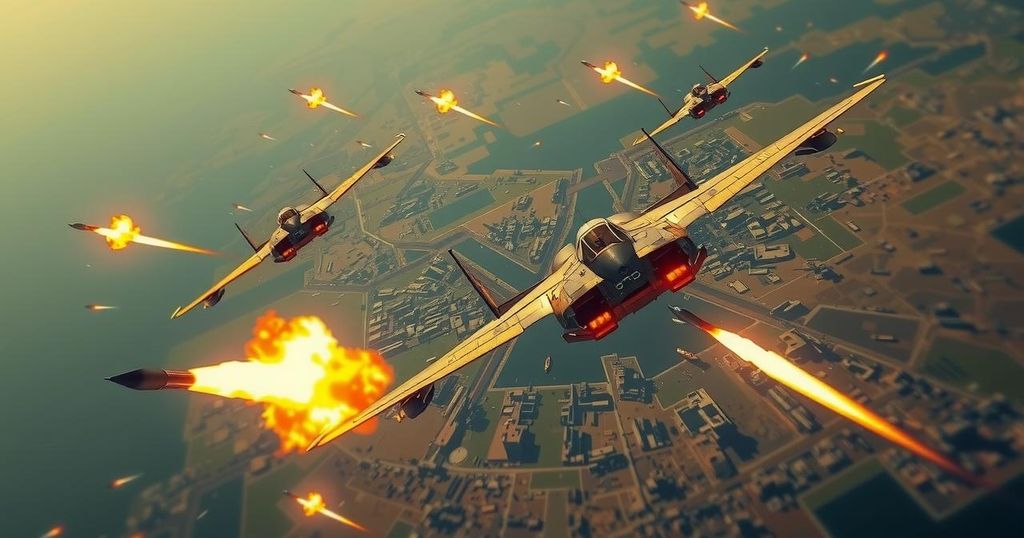Escalating Violence: Recent Rocket Attacks from Lebanon Cause Civilian Casualties in Israel
Recent rocket fire from Lebanon has killed at least seven people in northern Israel, marking a significant escalation amid ongoing conflicts involving Iranian-backed groups such as Hezbollah and Hamas. U.S. diplomats are in the region advocating for cease-fires while Israel has conducted airstrikes in Syria targeting Hezbollah operations. The death toll from the ongoing conflict has surpassed 2,800 in Lebanon, with significant casualties also reported in Israel. Diplomatic efforts are ongoing but face considerable challenges as both sides remain inflexible in their demands.
Tel Aviv, Israel – Recent rocket fire from Lebanon has tragically resulted in the deaths of at least seven individuals in northern Israel, including four foreign workers. This incident marks the deadliest assault of its kind since the commencement of Israel’s military operations earlier this month. The attack, which targeted two separate locations, coincided with the presence of senior U.S. diplomats in the region, who are advocating for cease-fire agreements in both Lebanon and Gaza as efforts continue to quell the ongoing conflicts involving Israel and Iranian-backed militias in the Middle East ahead of the conclusion of the Biden administration’s term. Since the terrorist attack launched by Hamas on October 7, 2023, from the Gaza Strip, Hezbollah, an Iranian-aligned militant group, has repeatedly fired rockets and drones into Israel, inciting retaliatory actions from the Israel Defense Forces (IDF). Both Hezbollah and Hamas maintain a close ideological partnership and are widely recognized as proxies of Iran, having been classified as terrorist organizations by the United States, Israel, and numerous other nations. In retaliatory measures, the Israeli military has conducted airstrikes targeting locations near Qusair, Syria, where it alleges Hezbollah has established weapon storage to facilitate smuggling operations into Lebanon. These airstrikes reportedly resulted in five fatalities. The intensity of the conflict escalated after the IDF executed a series of significant airstrikes against Hezbollah, leading to the elimination of the group’s high-ranking officials. Since the beginning of hostilities, Israeli forces have encountered over two dozen casualties in Lebanon while Lebanese health officials report that airstrikes have caused approximately 2,000 civilian deaths across the nation. The recent rocket assault, which struck an olive grove during the harvest period, was confirmed by the Metula regional council in northern Israel. Alongside the foreign workers, casualties included two other individuals identified as a 30-year-old male and a 60-year-old female, whose injuries were treated by medical responders. The IDF reported that around 25 rockets were launched from Lebanon during this barrage. In light of the ongoing hostilities, Hezbollah’s newly appointed leader Sheikh Naim Qassem expressed, “Hezbollah’s capabilities are still available and compatible with a long war.” Concurrently, the Israeli military urged residents to evacuate additional regions in southern Lebanon due to the continuing airstrikes that have resulted in eight more fatalities. Casualties of the conflict have reached over 2,800 deaths and nearly 13,000 injuries in Lebanon, coupled with the displacement of approximately 1.2 million people from their residences. Within Israel, Hezbollah’s aggression has led to the deaths of at least 68 individuals, nearly half of whom were soldiers, alongside the evacuation of over 60,000 citizens from border towns and cities. In an effort to negotiate a resolution to the conflict, U.S. and allied officials are proposing ceasefire agreements amid stalled negotiations. Discussions were reinvigorated with discussions held between Prime Minister Benjamin Netanyahu and senior U.S. officials, emphasizing the significance of security for Israel. In the proposals being circulated, one suggests a two-month ceasefire contingent upon a withdrawal of Israeli forces from Lebanon and a cessation of Hezbollah’s armed presence along the southern border. However, Israel remains cautious, distrustful of U.N. peacekeepers, and insists that it requires the autonomy to conduct operations against Hezbollah should the need arise. Meanwhile, U.S. and regional actors have also proposed a limited ceasefire in Gaza to facilitate the potential release of hostages held by Hamas. However, negotiations remain contingent on both sides reaching acceptable terms for a sustainable truce.
The ongoing conflict between Israel and Hezbollah, as well as Hamas, has its roots in long-standing political, ideological, and territorial disputes in the Middle East. The recent escalation began when Hamas launched a significant terrorist attack in October 2023, leading to intense military responses from Israel. The involvement of Iranian proxies in these conflicts complicates the geopolitical situation, as both Hezbollah and Hamas are supported by Iran, which exacerbates tensions in the region. Efforts for cease-fires and negotiations have been frequently interrupted, highlighting the challenge mediators face in achieving a sustainable resolution amidst deeply entrenched hostilities.
The recent rocket attacks from Lebanon that resulted in civilian casualties highlight the continuing volatility of the situation along Israel’s northern border. As diplomatic efforts intensify to negotiate cease-fires in Lebanon and Gaza, the stalled negotiations reflect the complexities involved when attempting to reconcile the demands of both sides. The recent escalation in violence has resulted in significant loss of life and displacement, further complicating any potential resolution. Until a satisfactory agreement can be reached, the dangers of further military conflict remain imminent.
Original Source: www.cbsnews.com




Post Comment